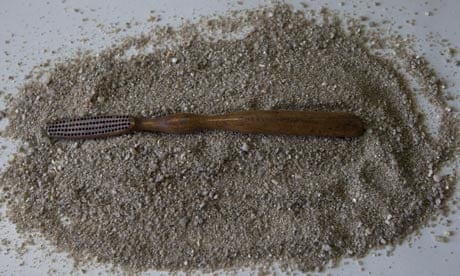An ivory toothbrush thought to have belonged to Brazil's Emperor Pedro II, and a minty toothpaste made by a European chemist for the Portuguese queen, are among more than 200,000 objects dating from the 17th to 19th centuries that archeologists have unearthed from a site in Rio de Janeiro being used for an extension of the city's subway lines.
A team of more than two dozen archeologists, historians and others began excavating the plot in northern Rio last March. The plot, once the site of a slaughterhouse, is near the former imperial palace and is thought to have once been used as a landfill by the imperial family and others, team members said on Wednesday.
The area, now a construction site for Rio's massive subway expansion project, has not only yielded an impressive number of objects but also pieces in remarkably good condition, the team leader Claudio Prado de Mello said.
"What is the most impressive is the intact state" of many objects, said Mello. "In archeology we usually find very fragmented pieces, but this time we're finding whole objects."
The ivory toothbrush, thought to have belonged to Dom Pedro II, who ruled over Brazil from 1831 to 1889, has turned brown with age. Its boar bristles are long gone, but the inscription remains legible: "His Majesty the Emperor of Brazil." A round white porcelain pot emblazoned with "to the Queen of Portugal Maria of Saboia" is thought to have contained mint-flavoured toothpaste made specially for the queen by a chemist with offices in London and Paris.
The site has also yielded dozens of intact glass and ceramic bottles thought to have once contained water imported from Europe for the imperial family. Six sealed bottles still contain unidentified liquids that the team plans to send to a laboratory for analysis. Dozens of coins and pipes were also found, along with a golden ring and a tie tack.
The excavation area has been covered up pending the subway expansion project, which is scheduled to be ready before the 2016 Olympic Games that Rio is hosting. Excavations are to resume after the project's completion, Mello said.

Comments (…)
Sign in or create your Guardian account to join the discussion